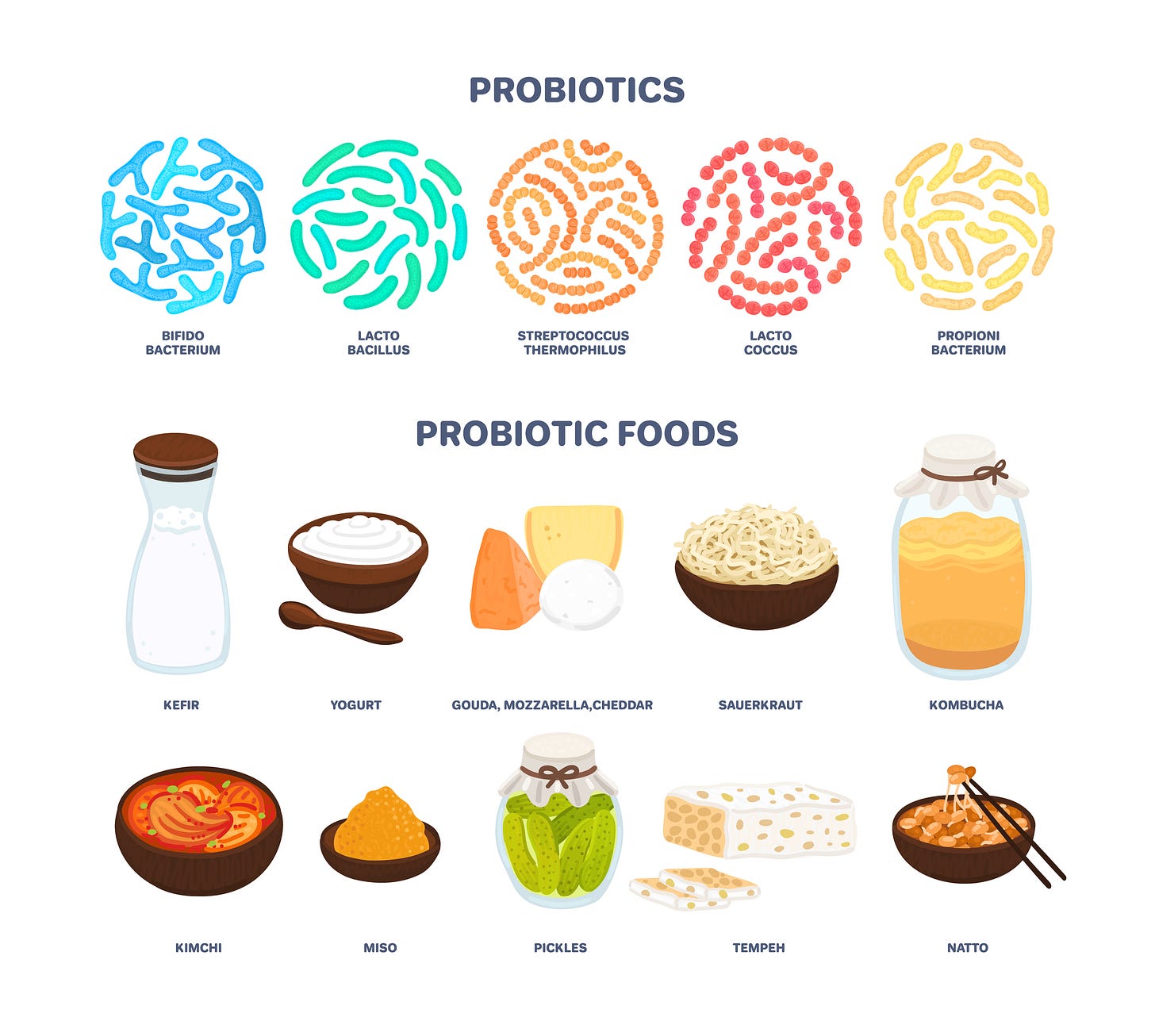Health Notes from Popular Rationalism: Probiotics, Gut Flora, and Adaptive Immunity
Feeding the Immune System's Hidden Allies: How Probiotics Can Transform Your Health
Health Notes, part of Popular Rationalism, provides a brief, informal review of the scientific literature on topics with important implications for human health. It should not be mistaken for medical advice.
The connection between our microbiome and autoimmune diseases remained a mystery for decades. Despite numerous studies, the exact mechanisms linking gut health to autoimmunity were elusive. However, repeated associations between dysbiosis—a microbial imbalance in the gut—and autoimmune conditions persisted, suggesting that our gut flora plays a crucial role in our immune health.
Some probiotics like kefir can contain high amounts of sugar and can lead to chronic issues like Candida infections and may not be appropriate for individuals with insulin resistance and diabetes.
Recent advances in microbiome research have illuminated how probiotics, the beneficial live microorganisms, can restore gut flora and stimulate adaptive immunity. These tiny allies (or, as I refer to them in the Microbiome Master Class, our “wee beasties”), work tirelessly within our intestines to maintain a balanced microbial environment and work with us to continuously create the gut/lumen interface, which is essential for preventing the colonization of harmful pathogens, proper nutrition, and, it turns out, supporting our immune system. They deserve a regular diet of prebiotics (e.g., fibers like inulin, acacia, and psyllium husk).
The Role of Probiotics in Immune Health
Probiotic microbial species such as Lactobacillus and Bifidobacterium are not just about digestion. They significantly influence the immune system by enhancing the gut's barrier function, producing essential metabolites, and interacting with the gut-associated lymphoid tissue (GALT). These interactions stimulate the production of cytokines like IL-6 and macrophage chemoattractant protein 1, crucial for immune responses (Wang et al (2021).
Probiotics also modulate the activity of immune cells, including T cells and B cells, vital for adaptive immunity. By adhering to intestinal epithelial cells through Toll-like receptors, probiotics trigger a cascade of immune responses that bolster mucosal immunity and protect against infections and inflammatory diseases (Maldonado Galdeano et al., 2019, Georgieva et al., 2015).
Probiotics, such as various strains of Lactobacillus and Bifidobacterium, have been shown to increase the number and activity of Tregs. This enhancement helps to regulate the immune system, reducing inflammation and promoting tolerance to self-antigens, which is particularly beneficial in preventing autoimmune diseases.
Key Mechanisms and Studies
Modulation of Gut Microbiota: Probiotics alter the composition of gut microbiota, promoting the growth of beneficial bacteria that produce short-chain fatty acids (SCFAs). SCFAs, particularly butyrate, have been shown to enhance Treg differentiation and function (Wang et al, 2021, Nigam, 2018).
Direct Interaction with Immune Cells: Probiotics interact directly with dendritic cells in the gut, promoting the production of anti-inflammatory cytokines such as IL-10 and TGF-β. These cytokines are crucial for the induction and maintenance of Tregs (Georgieva et al., 2015; Maldonado Galdeano et al., 2019).
Clinical Evidence: Several studies have demonstrated that probiotic supplementation can increase Treg populations in humans and animal models. For example, a study on patients with inflammatory bowel disease (IBD) showed that probiotics increased Treg numbers and improved clinical symptoms (Nigam, 2018, Maldonado Galdeano et al., 2019).
Moreover, probiotics can reduce gut permeability, preventing the translocation of pathogens and toxins into the bloodstream, a key factor in maintaining immune homeostasis and preventing systemic inflammation (Wang et al., 2021).
Inspiring a Probiotic-Rich Lifestyle
Given the profound impact of probiotics on our health, it's time to prioritize gut health as a cornerstone of overall well-being. Incorporating probiotic-rich foods such as yogurt, kefir, sauerkraut, and kimchi into our diets can be a simple yet powerful way to support our immune system.
Additionally, consider supplementing with high-quality probiotic formulations, especially after antibiotic treatments or during periods of high stress, to restore and maintain a healthy gut microbiome.
In essence, nurturing our gut flora through probiotics fortifies our immune defenses and enhances our overall health, reducing the risk of autoimmune diseases and other inflammatory conditions. Embrace this knowledge and take proactive steps to cultivate a vibrant and resilient microbiome.
Stay informed, stay healthy, and let your microbiome thrive.
Citations
For further reading, explore these comprehensive citations.
Georgieva, M, K Georgiev and P Dobromirov. 2015. Probiotics and Immunity Probiotics and Immunity https://www.intechopen.com/chapters/49383 https://sci-hub.se/10.5772/61337
Maldonado Galdeano C, Cazorla SI, Lemme Dumit JM, Vélez E, Perdigón G. Beneficial Effects of Probiotic Consumption on the Immune System. Ann Nutr Metab. 2019;74(2):115-124. doi: 10.1159/000496426. Epub 2019 Jan 23. PMID: 30673668
Nigam, D. (2018). Probiotics as Functional Foods in Enhancing Gut Immunity. In: Rani, V., Yadav, U. (eds) Functional Food and Human Health. Springer, Singapore. https://doi.org/10.1007/978-981-13-1123-9_4





Need pre : probiotics and fermented foods to heal the gut for optimal absorption of nutrients.
SEED probiotics -$50/month
Florastor- best price is from BJ's -$60.00 3 month supply
NuZymes- enzyme boost
These have proved most successful for MY family, however there are many on the market, you do not have to pay insane prices, higher the price does not always mean better...
There are many probiotics out there.
Test some, try as directed for about 4 weeks, if you don't feel better, skin has not improved and you are not 'regular' still feel bloated they may not be for you.
Don't go for the stuff sold in discount, or big market stores...
Also, take the probiotics before bed on empty stomach, they help the body in sleeping, since the body is re-setting overnight, and gives the gut the time to reformat.